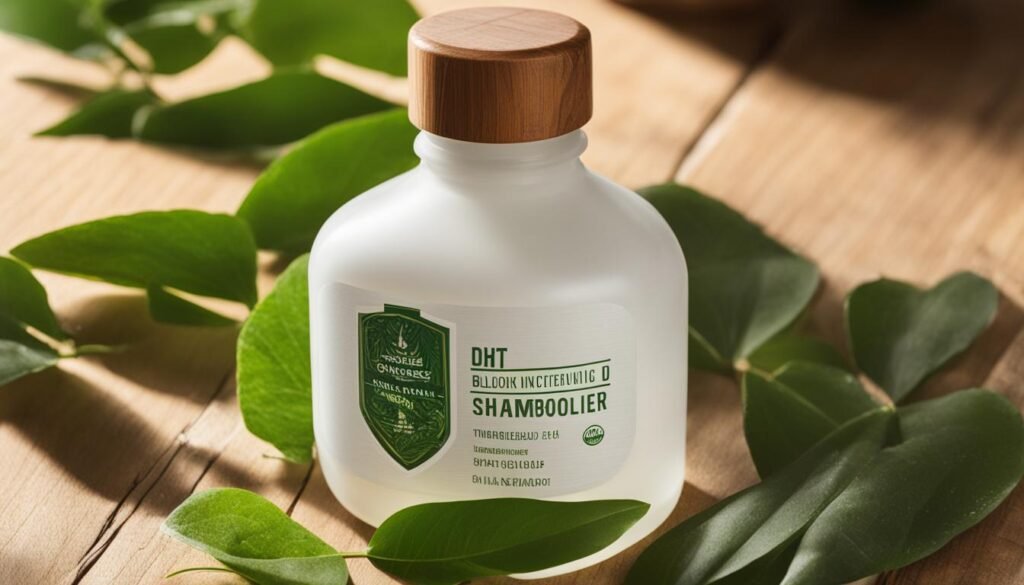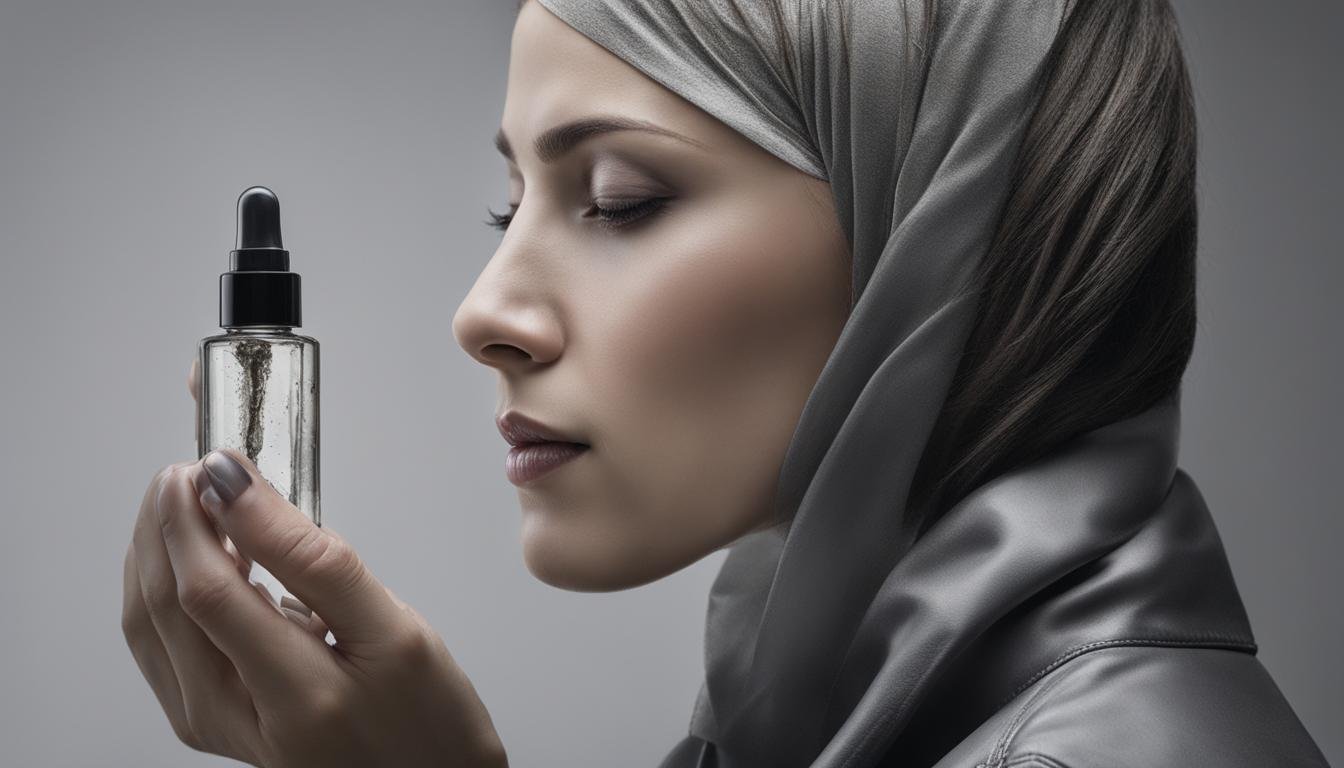A DHT blocker for hair is a medication or supplement that targets dihydrotestosterone (DHT), a hormone responsible for hair thinning and hair loss. DHT blockers work by inhibiting the production or action of DHT, thereby preventing further hair loss and promoting hair growth.
DHT is produced from testosterone with the help of an enzyme called 5-alpha reductase. By blocking this enzyme, DHT blockers can effectively reduce the negative effects on hair follicles and support the health of existing hair and new hair growth.
There are various types of DHT blockers available, including natural options like certain foods, as well as prescription medications. Natural DHT blockers include green tea, onions, coconut oil, and pumpkin seeds, among others. Prescription DHT blockers such as finasteride and spironolactone have been approved by the FDA for the treatment of hair loss in specific cases.
If you’re experiencing hair loss or thinning, understanding the role of DHT and exploring DHT blockers can be an important step in managing your hair health. It’s always best to consult with a healthcare provider to determine the most suitable treatment approach based on your individual needs and circumstances.
Foods That Block DHT and Prevent Hair Loss
Certain foods have been found to naturally block DHT production and prevent hair loss. Incorporating these foods into your diet may help promote healthy hair growth. Here are some natural DHT blockers:
1. Green Tea
Green tea contains a plant compound called epigallocatechin gallate (EGCG) that has been found to protect hair follicles from damage caused by DHT. Enjoy a cup of green tea daily to potentially support hair health and prevent hair loss.
2. Coconut Oil
Rich in medium-chain triglycerides (MCTs), coconut oil has shown potential in blocking DHT production. Incorporate coconut oil into your cooking or apply it topically as a hair mask to promote healthier hair.
3. Onions
Onions and other foods rich in quercetin, such as apples and berries, can inhibit the production of DHT from testosterone. Include onions in your meals to potentially reduce DHT levels and support hair growth.
4. Turmeric
Turmeric, known for its active compound curcumin, has demonstrated the ability to block DHT in studies. Add turmeric to your cooking or consider taking curcumin supplements to potentially combat hair loss.
5. Pumpkin Seeds
Pumpkin seeds contain ingredients that may inhibit the enzyme responsible for DHT production. Snack on pumpkin seeds or incorporate them into your meals to potentially lower DHT levels and support hair health.
6. Edamame
Edamame beans, rich in isoflavones, have been found to lower DHT levels. Include edamame in your diet as a snack or as part of main dishes to potentially promote healthier hair.
While these foods have shown promise in blocking DHT, it is important to note that further research is needed to determine their effectiveness in humans. Incorporating a variety of nutrient-rich foods into your diet, along with a healthy lifestyle, can contribute to overall hair health and potentially help prevent hair loss.
Natural DHT Blockers
| Food | Properties |
|---|---|
| Green Tea | Contains EGCG, which protects hair follicles from DHT damage |
| Coconut Oil | Rich in MCTs, potentially blocks DHT production |
| Onions | Rich in quercetin, inhibits DHT production |
| Turmeric | Contains curcumin, shown to block DHT |
| Pumpkin Seeds | May inhibit DHT-producing enzyme |
| Edamame | Rich in isoflavones, lowers DHT levels |
Prescription DHT Blockers for Hair Loss
In addition to natural options, there are prescription DHT blockers available for treating hair loss. These medications have shown effectiveness in preventing further hair loss and even promoting hair growth. However, it is important to note that they may also have side effects and should be used under the guidance of a healthcare provider.
Finasteride: One of the most well-known prescription DHT blockers is finasteride. Approved by the FDA for hair loss treatment in men, finasteride works by inhibiting the enzyme that converts testosterone into DHT. By reducing DHT levels, finasteride helps to prevent hair loss and potentially stimulate hair regrowth.
Spironolactone: While primarily used as a diuretic, spironolactone is also commonly prescribed off-label for female pattern hair loss. It is an anti-androgen that reduces total testosterone levels and blocks androgen receptors, which can help to combat hair loss in women.
Cyproterone Acetate: Another prescription DHT blocker, cyproterone acetate, is often used in the treatment of androgenetic alopecia in women. It works by blocking androgen receptors and reducing testosterone levels, thereby reducing the impact of DHT on hair follicles.
These prescription options can be highly effective in managing hair loss, but they should only be used after consulting with a healthcare provider. It is important to discuss the potential risks and benefits of these medications based on individual circumstances and medical history.
Prescription DHT Blockers for Hair Loss
| Prescription DHT Blockers | Primary Mechanism of Action | Approved Usage |
|---|---|---|
| Finasteride | Inhibits the enzyme that converts testosterone into DHT | Treatment of hair loss in men |
| Spironolactone | Reduces total testosterone levels and blocks androgen receptors | Off-label use for female pattern hair loss |
| Cyproterone Acetate | Blocks androgen receptors and reduces testosterone levels | Treatment of androgenetic alopecia in women |
DHT Blocker Shampoos for Hair Loss
DHT blocker shampoos are a popular choice for individuals looking to combat hair loss. These shampoos typically contain natural ingredients that are believed to have DHT-blocking properties, helping to maintain healthy hair follicles and promote hair growth.
One key ingredient you might find in DHT blocker shampoos is saw palmetto, a plant extract known for its potential anti-androgen effects. Saw palmetto has been used in traditional medicine for hair loss and is believed to work by inhibiting the enzyme responsible for converting testosterone into DHT.
Another ingredient commonly found in DHT blocker shampoos is ketoconazole. This antifungal ingredient has been included in some shampoos due to its potential to reduce DHT levels. It has also been found to have anti-inflammatory properties that may benefit the scalp.
Caffeine is another ingredient that can often be found in shampoos targeted for hair loss. Research suggests that caffeine may stimulate hair growth by promoting blood circulation to the hair follicles and extending the hair’s growth phase.
Biotin, a B vitamin, is another frequent addition to DHT blocker shampoos. Biotin is known for its role in supporting overall hair health and promoting hair growth.
While these ingredients show promise in blocking DHT and promoting hair growth, it’s important to note that the effectiveness of DHT blocker shampoos can vary among individuals. Some people may experience noticeable results, while others may not see significant improvements. Additionally, using DHT blocker shampoos alone may not be sufficient for addressing severe or advanced hair loss.

Side Effects of DHT Blockers
Like any medication or supplement, DHT blockers can have side effects. It’s important to understand the potential risks and discuss them with a healthcare provider before starting any treatment. Here are the side effects associated with some commonly prescribed DHT blockers:
Finasteride Side Effects
Finasteride is a commonly prescribed DHT blocker used for hair loss treatment in men. While it is generally well-tolerated, some individuals may experience the following side effects:
- Decreased libido
- Erectile dysfunction
- Breast tenderness or enlargement
Spironolactone Side Effects
Spironolactone is another prescription DHT blocker that is often used off-label for female pattern hair loss. It may cause the following side effects:
- Fatigue
- Irregular menstruation
- Breast tenderness or enlargement
Cyproterone Acetate Side Effects
Cyproterone acetate, another prescription DHT blocker, can have the following side effects:
- Lowered sex drive
- Tender breasts
- Weight gain
It’s important to note that not everyone will experience these side effects, and the severity and frequency can vary. If you are considering DHT blockers for hair loss, it’s crucial to have a thorough discussion with your healthcare provider to weigh the potential benefits against the risks and determine the most suitable treatment approach for your specific situation.
Remember, these side effects should be discussed with a healthcare professional to ensure proper guidance and monitoring throughout the treatment process.
Note: The image above is for illustrative purposes only and does not depict the specific side effects of DHT blockers.
Reviews of DHT Blockers for Hair Loss
User experiences with DHT blockers for hair loss can vary greatly. While some individuals may report positive results and significant improvement in their hair loss, others may have different opinions and may not experience the same benefits. It is important to understand that the effectiveness of DHT blockers can differ from person to person due to individual variations in response to the treatment.
Before starting any DHT blocker regimen, it is crucial to consult with a healthcare provider or a hair loss specialist. They can evaluate your specific condition and determine the most suitable treatment approach for your hair loss concerns. They may also consider any potential interactions, contraindications, or side effects that could arise based on your personal health profile.
If you are considering using DHT blockers, it is recommended to do thorough research and read reviews from reputable sources. Hearing about the experiences of others who have used DHT blockers can provide valuable insights and help you make an informed decision. However, keep in mind that everyone’s experience may not be the same, and individual results may vary.
“After trying various remedies for my hair loss, I decided to give DHT blockers a shot. I noticed a significant reduction in hair shedding and saw small regrowth in certain areas. It took patience and consistency, but I’m happy with the results.” – Sarah
“I tried a well-known DHT blocker product for several months, but unfortunately, I didn’t see any noticeable improvement in my hair loss. It just didn’t work for me, but I think it’s important to remember that what works for one person may not work for everyone.” – Michael
| Pros | Cons |
|---|---|
|
|
It’s important to approach DHT blockers with realistic expectations and understand that they may not work for everyone. Each individual’s response to these blockers can differ, and factors such as the underlying cause of hair loss, overall health, and genetic predisposition can also play a role in the efficacy of the treatment. Working closely with a healthcare professional can help determine the best course of action for addressing your specific hair loss concerns.
Other Hair Loss Treatment Options
In addition to DHT blockers, individuals experiencing hair loss have several other treatment options available to them. One such option is minoxidil, a topical medication that has been approved by the FDA for both men and women. Minoxidil is commonly used to promote hair growth and has shown promising results in many cases.
Another approach to combating hair loss is through the use of vitamins and minerals that support hair health. Certain nutrients, such as biotin, zinc, and iron, play a crucial role in maintaining healthy hair growth. These can be taken as supplements to help nourish hair follicles and promote healthier, stronger hair.
For those seeking more advanced treatment options, light therapy, hair transplants, and platelet-rich plasma (PRP) injections can be considered. Light therapy, also known as low-level laser therapy, uses red or near-infrared light to stimulate hair follicles and promote hair growth. Hair transplants involve surgically moving hair follicles from one area of the scalp to another, while PRP injections involve injecting a concentrated solution of platelets into the scalp to stimulate hair growth.
It is important to note that while these alternative treatments may work for some individuals, they may not be suitable or effective for everyone. It is recommended to consult with a healthcare provider or a specialist in hair loss to determine the most appropriate treatment plan based on individual hair loss concerns and goals.
